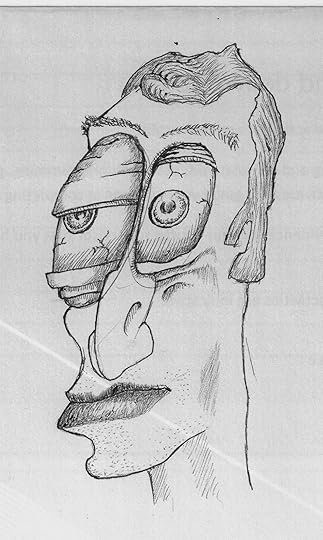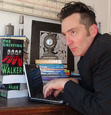Sleep is for Eeeeejits
I wrote this at about 1am last night, due to a complete lack of somnia;
I could blame this on a late coffee, but that’s not the whole story. It’s like I’m holding a lottery ticket. I’m in that wondrous, speculative period in between purchase and draw. A guy once said to me that the odds of winning lotto are fifty fifty; you either win or you don’t. I didn’t argue.People pay for lottery tickets thinking they are purchasing a chance to win. The people who sell the lottery ticket know that the chances of winning are astronomically thin; the winners are the pinpricks of light in the night sky that our eyes are drawn to amidst the sea of darkness created by all the dud tickets. I understand that. Heck, I teach the mathematics that governs chance (permutations and combinations). But what people are mostly paying for is the permission to imagine what they might do with the money they could win. I’m imagining.And it's keeping me awake... [a stoopid self-portrait I dun on a scrap peice of paper][ballpoint on paper - approx A5]
[a stoopid self-portrait I dun on a scrap peice of paper][ballpoint on paper - approx A5]
1. So, I’m thinking about Conversation again. (The public speaking format.) I haven’t organised a competition for many years. I would enjoy doing so again, now that I’ve had time to consider the improvements that need to be made to the mechanics.- Open questions are the key to a good Conversation. The role of Conversation is to avoid an over-reliance on debate and bi-partisan allegiance. That is, people on either side should feel free to express ideas without feeling restricted to supporting a ‘for’ or ‘against’ stance. They should feel free to outline conflicting opinions, to express frustrations and to open themselves up to hypocrisy.- Examples of conversation topics include; After Utopia. A good roll makes for a sound day. Feed a human a fish. How to take asylum. That’s some fine dirt. How sustainability be made more consumable. Functions of a stable ecolomy. The role of education for special humans. The intersection of state neglect and individual responsibility. How can we do (x)? - So long as the audience has an odd number, people can vote on the winning team. The team, because they are not necessarily aligned with a positive or negative viewpoint on the topic, are then separate from the ideas generated by the Conversation. This means that good ideas can exist in isolation from the personalities or the parties that created them.
2. I’m thinking about methods for teaching history, tying in developmental psychology and technology.- imagine a line. The person (student) initially has adults adding the child(s) development and activities onto the line for them, giving the line an initial scale by these efforts. The child is encouraged to visit this timeline. It may be a collection of photographs, writings, video recordings, graphs etc. placed in chronological order along the line. Once the child is capable, they may add their own information to the timeline, creating a digital diary. Once the child is ready, they may zoom out and begin to add events from before their birth. (With reference to the present, by way of when in their present they are exploring the past). In theory, if the student subscribes to commonly held theory, the timeline should grow to be six billion years long, with most of the activity occurring in the atomically thin sliver of time up one end; their lives. The aim is not to fill the line completely, but merely to continue to add to it. -As an educational tool, this allows for students to own their own version of history. To become historians of their own world view. Historical analysis and projects done by students can be recorded on the timeline, along with their own criticisms and conflicts about their own work. They can watch their own ideas change over time and compare and contrast between published works and the timelines of others.- As a personal history, it allows for the individual to reflect and add to their own experience and understanding of their place and time in the universe, potentially throughout their lives.-This model does not discount alternate views of history, as the timeline might be only six thousand years old for some faith systems. It can still be used by people with such beliefs. For some, the timeline might even branch…-I can see that it is achievable using current programs, such as Notebook 10 or One-note, however I can see that it may be a desirable to create a program from scratch. One that has an ability to zoom in and out, set scales of quick reference that can be shifted to frames of reference or fields of personal interest. It would also have to allow for easily mounted or linked file types and a large degree of storage types and search-ability.3. I’m thinking about the desert city…
I could blame this on a late coffee, but that’s not the whole story. It’s like I’m holding a lottery ticket. I’m in that wondrous, speculative period in between purchase and draw. A guy once said to me that the odds of winning lotto are fifty fifty; you either win or you don’t. I didn’t argue.People pay for lottery tickets thinking they are purchasing a chance to win. The people who sell the lottery ticket know that the chances of winning are astronomically thin; the winners are the pinpricks of light in the night sky that our eyes are drawn to amidst the sea of darkness created by all the dud tickets. I understand that. Heck, I teach the mathematics that governs chance (permutations and combinations). But what people are mostly paying for is the permission to imagine what they might do with the money they could win. I’m imagining.And it's keeping me awake...
 [a stoopid self-portrait I dun on a scrap peice of paper][ballpoint on paper - approx A5]
[a stoopid self-portrait I dun on a scrap peice of paper][ballpoint on paper - approx A5]1. So, I’m thinking about Conversation again. (The public speaking format.) I haven’t organised a competition for many years. I would enjoy doing so again, now that I’ve had time to consider the improvements that need to be made to the mechanics.- Open questions are the key to a good Conversation. The role of Conversation is to avoid an over-reliance on debate and bi-partisan allegiance. That is, people on either side should feel free to express ideas without feeling restricted to supporting a ‘for’ or ‘against’ stance. They should feel free to outline conflicting opinions, to express frustrations and to open themselves up to hypocrisy.- Examples of conversation topics include; After Utopia. A good roll makes for a sound day. Feed a human a fish. How to take asylum. That’s some fine dirt. How sustainability be made more consumable. Functions of a stable ecolomy. The role of education for special humans. The intersection of state neglect and individual responsibility. How can we do (x)? - So long as the audience has an odd number, people can vote on the winning team. The team, because they are not necessarily aligned with a positive or negative viewpoint on the topic, are then separate from the ideas generated by the Conversation. This means that good ideas can exist in isolation from the personalities or the parties that created them.
2. I’m thinking about methods for teaching history, tying in developmental psychology and technology.- imagine a line. The person (student) initially has adults adding the child(s) development and activities onto the line for them, giving the line an initial scale by these efforts. The child is encouraged to visit this timeline. It may be a collection of photographs, writings, video recordings, graphs etc. placed in chronological order along the line. Once the child is capable, they may add their own information to the timeline, creating a digital diary. Once the child is ready, they may zoom out and begin to add events from before their birth. (With reference to the present, by way of when in their present they are exploring the past). In theory, if the student subscribes to commonly held theory, the timeline should grow to be six billion years long, with most of the activity occurring in the atomically thin sliver of time up one end; their lives. The aim is not to fill the line completely, but merely to continue to add to it. -As an educational tool, this allows for students to own their own version of history. To become historians of their own world view. Historical analysis and projects done by students can be recorded on the timeline, along with their own criticisms and conflicts about their own work. They can watch their own ideas change over time and compare and contrast between published works and the timelines of others.- As a personal history, it allows for the individual to reflect and add to their own experience and understanding of their place and time in the universe, potentially throughout their lives.-This model does not discount alternate views of history, as the timeline might be only six thousand years old for some faith systems. It can still be used by people with such beliefs. For some, the timeline might even branch…-I can see that it is achievable using current programs, such as Notebook 10 or One-note, however I can see that it may be a desirable to create a program from scratch. One that has an ability to zoom in and out, set scales of quick reference that can be shifted to frames of reference or fields of personal interest. It would also have to allow for easily mounted or linked file types and a large degree of storage types and search-ability.3. I’m thinking about the desert city…
Published on February 11, 2014 00:25
No comments have been added yet.



